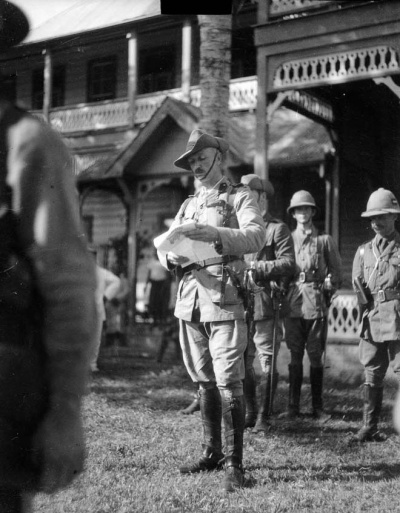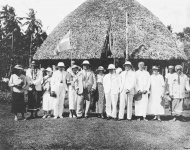Events In History
-
 21 March 2003Race Relations Day celebrated for first time
21 March 2003Race Relations Day celebrated for first timeRace Relations Day was first formally celebrated in 2003 with the theme, 'Hands Up for Kiwis of Every Race and Place'. Read more...
-
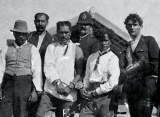 2 April 1916Arrest of Rua Kēnana
2 April 1916Arrest of Rua KēnanaOn Sunday 2 April 1916, 57 police raided the Ngāi Tūhoe settlement of Maungapōhatu in the Urewera Ranges. Read more...
-
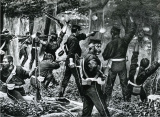 9 June 1868Beginning of Tītokowaru's war
9 June 1868Beginning of Tītokowaru's warNgā Ruahine fighters led by Riwha Tītokowaru killed three Pākehā settlers near Ketemarae, north of Hāwera, signalling the resumption of fighting in south Taranaki. Read more...
-
 6 April 1864Pai Mārire ambush in Taranaki
6 April 1864Pai Mārire ambush in TaranakiA British patrol was ambushed by Pai Mārire fighters near Ōakura. The heads of the seven men killed were taken around the North Island by Pai Mārire disciples to encourage enlistment in the movement. Read more...
Articles
The Treaty in practice
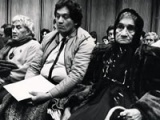
Amalgamating Māori into colonial settler society was a key part of British policy in New Zealand after 1840. Economic and social change, along with land-purchase programmes, were central to this process.
-
Page 6 – The Treaty debated
Modern New Zealand has debated the Treaty of Waitangi as never before. Understanding, reconciliation, protest and confrontation have been part of this process.
Māori and the First World War
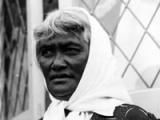
Māori reactions to serving in the First World War largely reflected iwi experiences of British actions in the 19th century.
- Page 2 - White man's war?Imperial policy initially doubted the wisdom of 'native' troops fighting a 'white man's
Waitangi Day
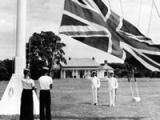
Every year on 6 February, New Zealand marks the signing of the Treaty of Waitangi in 1840. For most people, Waitangi Day is a holiday; for many, and especially for Māori, it is a time for reflecting on the Treaty and its place in modern New Zealand.
-
Page 4 – Waitangi Day 1960s
The Waitangi Day Act 1960 declared 6 February to be Waitangi Day; a national day of thanksgiving in commemoration of the signing of the Treaty of Waitangi.
-
Page 5 – Waitangi Day 1970s
Waitangi Day, a public holiday from 1974, briefly became New Zealand Day in the 1970s. Increasingly, it became a focus for Māori protest activities.
-
Page 6 – Waitangi Day 1980s
The 1980s brought changes in the way Waitangi Day was marked officially, as well as growing Māori protest.
-
Page 7 – Waitangi Day 1990s
In the 1990s Waitangi Day events became a focus for protests about sovereignty.
Pai Marire
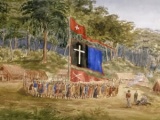
Pai Marire (goodness and peace) was one of several new Māori faiths to emerge in the 19th century. Like many others, it was closely tied to issues of land and politics.
- Page 2 - Te Ua HaumēnePai Mārire disciples travelled around the North Island in the mid-1860s. Against a backdrop of war and land confiscations, the founding principle of Pai Marire was often
The Vogel era

In 1870, Colonial Treasurer Julius Vogel launched the most ambitious development programme in New Zealand’s history. The ‘Vogel era’ was a decisive moment in New Zealand’s 19th-century transformation from a Māori world to a Pākehā one.
- Page 3 - Vogel's visionIn June 1870, Vogel unveiled the most ambitious public works and assisted-immigration programme in New Zealand’s
Queen Elizabeth II

Queen Elizabeth II became New Zealand's monarch on 6 February 1952, following the death of her father, King George VI
- Page 4 - Māori and the QueenMāori ‘were primarily concerned to express their loyalty to the Crown and to win acceptance as New Zealand citizens.’ They were just as enthusiastic about the tour as other
Biographies
-
 Fitzgerald, James Edward
Fitzgerald, James Edward
James Edward Fitzgerald was a provincial and national politician
Read more...
Related keywords
- maori leaders
- riwha titokowaru
- kingitanga
- railways
- julius vogel
- economy
- public works
- immigration
- assisted immigration
- maori land
- new zealand wars
- pai marire
- religion
- queen elizabeth
- royal tours
- maori
- royalty
- james edward fitzgerald
- canterbury association
- maori land court
- te ua haumene
- christianity
- moutoa gardens
- land confiscation
- protest
- public holidays
- waitangi day
- hikoi
- 1980s
- sesquicentenary
- treaty claims
- WW1
- maori in war
- peter buck
- apirana ngata
- maori contingent
- samoa
- robert logan
- german samoa occupation
- chinese
- rua kenana
- maungapohatu
- law
- 1960s
- olaf nelson
- mau movement
- pacific peoples
- centennial
- treaty of waitangi
- national identity
- 1950s
- norman kirk
- new zealand day
- matiu rata
- waitangi tribunal
- 1970s
- whina cooper
- urbanisation
- nga tamatoa
- bastion point
- northern war
- george clarke
- george grey
- robert fitzroy
-
Main image: Robert Logan in Samoa
Colonel Robert Logan in Apia, Samoa, on 30 August 1914, the morning after he assumed responsibility as Administrator.

